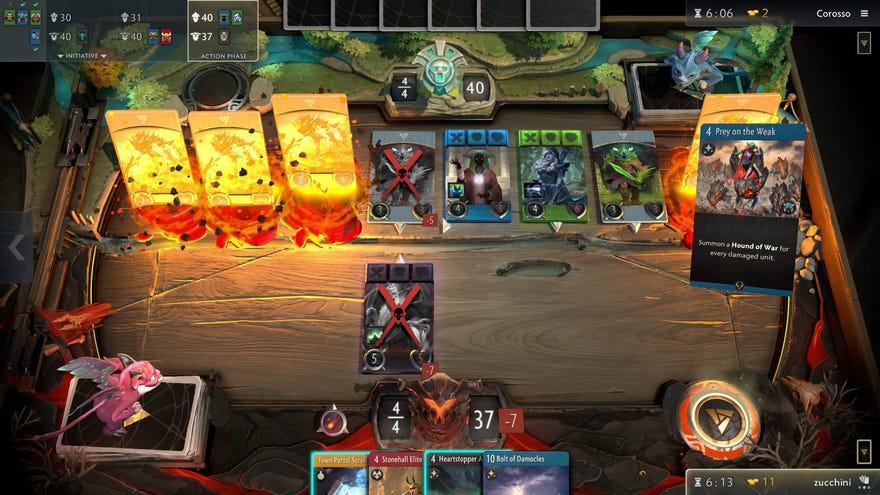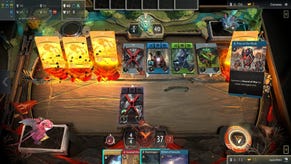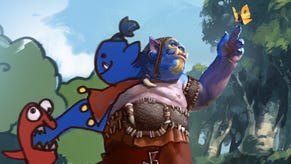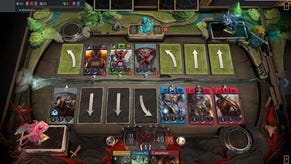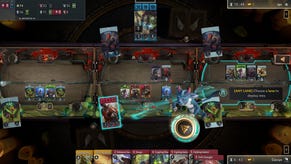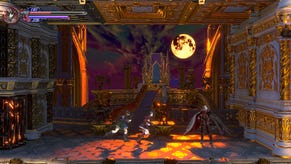Ex-Artifact dev Richard Garfield on what went wrong
A hearty chat
It came, we saw, it failed to conquer. Personally, I've looked at Artifact's floundering playerbase with a heavy heart, because it's a a great game that deserves better. That's why I was interested to see Richard Garfield (of Magic: The Gathering fame) Arti-chatting about the game's rocky launch, and what it actually means for a game to be "pay-to-win".
Garfield said all this to Win.gg. Cheers, Win!
Let's put our juiciest foot forward. The main complaints people levelled against Artifact, me included, were to do with its stingy pricing model that, after spending £16 on the game, didn't allow you to earn cards by playing. Cards can be bought via booster packs or from an in-game market, where players were free to price cards as they wish - and let sweet sweet free-market economics determine their value. One of the most powerful cards cost £13 in the week after the game's launch.
When asked about his reactions to the backlash, Garfield acknowledged that "there were also a lot of complaints about the revenue model, which appeared generous to Magic players, but stingy to players who expected free-to-play with grinding for cards." He expanded:
"There was growing worry on the team. My perspective was that there were three problems - the revenue model was poorly received, there weren't enough community tools and short-term goals in place online like achievements or missions, and, perhaps because of these things, there was a rating bombing that made it hard to get the message out about what the game offered to the player who it was built for.
"There were oodles of reviews that were, 'This game is great, but because of X I am thumbs downing it.' My understanding is that there were also many cases of people buying the game so they could rate it, then refunding immediately.
"Some of the team, however, was worried that they misjudged the play and elements of the play, like the RNG, which had been tested for many years. I have seen many times people project complaints they have about one element of the game onto its gameplay, and I think this was generally the case here."
I largely agree, although it also can't have helped that Artifact initially seems like it gives you far less control than you actually have. As I said in my Artifact review, all the random elements have cards and items that can subvert them. When chance dunks your plans into a bin, there's comfort in the knowledge that you could have planned differently.
My thoughts about his thoughts on the pricing structure are more mixed. He dismisses "pay-to-win" as "a sloppy term leveled at any game where you can buy components". He's not exactly wrong, but he's also glossing over how paying for components makes you more likely to, um, win. At least in constructed play, as opposed to the draft mode where I've spent 95% of my time.
There are two parts to pay-to-win, Garfield sez.
"The first is whether buying something will make you a champion. This is not true for Hearthstone, Magic, or for that matter, golf. It also isn’t true for Artifact. I am an OK player and a mediocre deck constructor in Artifact, and access to all of the cards won't change that. I might be able to overcome the mediocre deck construction by copying someone else's deck, but it won’t make me an excellent player. Likewise, I can spend thousands on golf clubs, but it won't make me a golf champion.
"Note that some games where you buy components don't pass this test - you can effectively buy infinite army units, skill levels, or hit points in some games, making it possible for you to overcome any problem by spending enough money.
"The second part of pay-to-win is what the bottom line expenditure is. Top level decks in Magic or Hearthstone generally cost more than top level decks in Artifact. And since there is a market, you can shift around your collection with relative ease."
Do remember this is the perspective of a designer who made a card game that can become eye-wateringly expensive, where (as far as I understand as a non-Magic player) the booster pack model means people can pay hundreds of pounds to gain an edge.
It also clearly differs from the perspective of some US senators, who recently took a stab at defining what pay-to-win means BY LAW. Brace yourself for some legalise:
"With respect to an interactive digital entertainment product that, from the perspective of a reasonable user of the product, is a game featuring competition with other users, provides a user with a competitive advantage with respect to the game’s competitive aspects over users who do not make such a transaction."
Note that bill hasn't yet passed, and may well not ever.
Garfield didn't have much to say about the future of Artifact, as he's no longer in contact with the team. He and fellow ex-Arti-dev Skaff Elias do touch on plenty else in the full interview over on Win, though, which is well worth a read.
